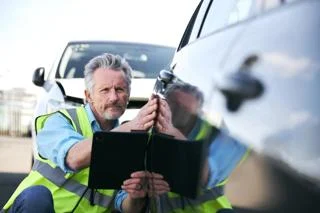New Marshall Leasing managing director Greg McDowell has pledged to continue the business ethos of predecessor Peter Cakebread, while steering the business through a sustained period of growth.
Cakebread, a multiple Fleet News Award winner and a member of the Hall of Fame, was widely recognised for his commitment to service standards, putting the customer at the heart of the business while looking after his staff.
It was, says McDowell, one of the reasons why Bank of Ireland bought the business in 2017, paying £42.5 million to Marshall Motor Holdings plc.
OBVIOUS CANDIDATE
McDowell was part of the acquisition team and supported the management through the integration period, making him the obvious candidate to take over when Cakebread retired in April after 30 years at the helm.
“We have long service among our colleagues and that enables the creation of a strong culture and understanding of personalised and flexible customer service,” said McDowell. “Now we have the ambition to grow.”
Seen as a non-core part of Marshall, the leasing division was not an investment priority. Consequently, it spent much of the previous decade with a risk fleet bumping around the 6,000-vehicle mark.
Now, with the bank’s support, it has added almost 3,000 vehicles in the past three years alone, taking it close to 9,000, with around 500 customers, entirely through organic business wins and deeper penetration among existing customers.
“Last year, we retreated from the high 8,000s to the low 8,000s and now we are back to where we were pre-Covid,” McDowell said.
“We now have aspirations for further growth, but we can’t lose that personalised and flexible approach. We have to scale the business while maintaining that service level – that’s both the challenge and the opportunity.”
While reluctant to share numbers, McDowell is eyeing a rise from last year’s 22nd placing in the FN50. “Moving up a number of places will be important,” he added.
Light commercial vehicles present an obviously target. Pre-acquisition, vans accounted for just 15% of Marshall’s risk fleet; today that has risen to 35% and McDowell anticipates further richening of the mix.
Marshall has also enjoyed success in the bodyshop sector and the school mini-bus market, growing from a standing start to 400 units in less than four years.
“We have solus relationships with many of our top 15-20 customers, but with some we have joint or multi-supply arrangements,” said McDowell.
“Increasing our penetration with them, and also the customers that we have on-boarded where Covid paused their ordering activity, gives us a good opportunity within our existing customer base.
“We are now seeing a return to ordering in the past four or five months as customers play catch-up. Demand is strong for LCVs as well as hybrid and electric, but demand for petrol and diesel is falling.”
McDowell believes changes to travel patterns, with people working from home and generally driving fewer miles, could result in rephasing of contract terms for cars.
“It is not unreasonable to expect slightly longer terms and less contracted mileage,” he said.
SUPPLY ISSUES
An immediate priority is working with customers to mitigate supply issues caused by the global semiconductor and component shortages.
McDowell predicts shortages will continue “well into next year” and is encouraging fleets to plan their renewals as early as possible, adding: “Any deferral in orders could see a much longer delay in supply.”
Bank ownership is already offering Marshall Leasing benefits. It not only weathered the storm of Covid-19 but was able to offer support to its customers through rental breaks to help their survival.
McDowell now expects to utilise cross-sell opportunities with corporate banking customers at both Bank of Ireland and its subsidiary Northridge Finance, while development work is underway on new products and services to plug the gaps in the Marshall portfolio. Further announcements will be made later this year.




















Login to comment
Comments
No comments have been made yet.